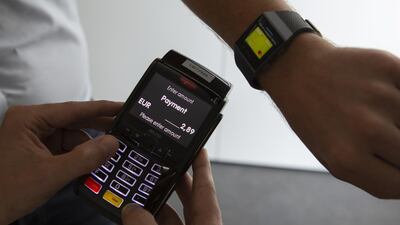Azimo’s chief executive Michael Kent cofounded the global digital payments platform in 2012 to reduce the cost and speed up the processing times of sending money abroad. Today customers are able to transfer money via the Azimo website or smartphone app to more than 190 countries, saving up to 90 per cent on fees and exchange rates.
The London-based company is now looking to crack the GCC’s outward remittance market — the World Bank estimates more than $100 billion (Dh367.31bn) get sent from the region.
"Digitalisation and the move against cash is starting to happen here quite quickly," Mr Kent tells The National. "We're looking to work out how best to tackle this market opportunity. $100bn market opportunities don't come along very often."
The UAE and Saudi Arabia are the second and third biggest outward remittance countries in the world, sending out $44.36bn and $36.11bn in 2017, according to the World Bank’s annual remittances data (the first is the US with $67.96bn). In the GCC, they are followed by Kuwait at $13.76bn, Qatar $12.75bn, Oman $9.81bn and Bahrain $2.46bn.
That is a significant chunk of the global remittance market, which is estimated to reach $715bn this year, according to the World Bank.
Market conditions in the region, including factors like increased smartphone penetration and digital adoption, are ripe for FinTech companies to enter the remittance industry and make sending money back home cheaper. Now it is just a question of how to go about it, whether it be local FinTech start-ups or global players like Azimo.
Mr Kent, who visited the UAE in February, says Azimo has plans to enter the GCC “in the next 18 months”. The challenge is how and whether to collaborate with existing operators.
“Part of the conversations that we’re having are: do we need to partner with somebody? Do we need to go stand-alone and get regulated ourselves?” says Mr Kent.
In the UAE, traditional financial institutions may not be willing to share the pot. In the fourth quarter of 2018, nearly three quarters of remittances went through the country's 102 exchange houses, while the rest was mainly wired from banks, according to the Central Bank.
Rajiv Raipancholia, chief executive of Orient Exchange and treasurer of the non-profit Foreign Exchange & Remittance Group, says on average exchange houses charge Dh15 to Dh22 to send money to countries like India, Pakistan, the Philippines, Bangladesh, Sri Lanka and Nepal, while it costs between Dh45 and Dh55 to send money to countries in Europe, North America and Australia. These are set charges, irrespective of the amount being sent, and do not include the mark-up on the exchange rate.
The top remittance receiving countries from the UAE are India at 40 per cent, Pakistan at 18 per cent, the Philippines at 13 per cent and Bangladesh at 8 per cent, according to World Bank figures.
“When we’re charging from 15 dirhams to 22 dirhams I think it’s a reasonable charge,” says Mr Raipancholia.
Exchange houses are cheaper than banks, which charge higher transaction fees and make bigger rate margins. Globally, banks are the most expensive type of service provider with an average cost of 10.9 per cent to send $200, according to the World Bank.
The global average for all transaction types was 6.76 per cent in the first quarter of 2019, which is still more than double the United Nation Development Programme’s migration-related sustainable development goal to reduce remittance costs to 3 per cent.
Azimo charges an average fee of £1.99 (Dh9.53) per transaction, in comparison to the £10 average charged by banks and offline money transfer providers, according to its website. It charges an average foreign exchange rate cost of .1 to 2.25 per cent, in comparison to 5 to 10 per cent charged by banks and offline providers.
Reducing the costs of money transfer and making it more convenient — rather than standing in a queue at a money exchange or bank branch — are also the two main goals of local FinTech companies entering the remittance space in the UAE, including Now Money, RemitNow and Denarii Cash.
Now Money, a payment services app for low-income migrant workers, was started by Ian Dillon and Katharine Budd in 2015. Although they raised $3.3 million in funding, the service only launched earlier this month due to the UAE’s changing regulatory landscape.
“There were more and more stringent conditions put on FinTech firms, and put on exchange houses, put on banks, which pushed our launch date back, back, back,” says Mr Dillon.
A federal decree on anti-money laundering and countering the financing of terrorism came into effect late last year, outlining new measures and imposing stricter penalties for violations.
FinTech firms face a particular challenge because they have certain restrictions on what services they can provide.
“The way regulation is in the UAE you basically need to be a regulated exchange house to allow customers to send money cross border,” says Mr Dillon. “Because we cannot really become an exchange house in our own right, we provide a service whereby they can use the existing exchange houses to send the money back quickly.”
Now Money, which currently has 4,000 customers, allows users to have a choice of exchange houses and shares the revenue 50/50.
“We get a better rate from the exchange house than you do if you go into a branch,” says Mr Dillon. “We also bulk the transactions. Instead of putting through one guy with 500 dirhams, we put through say 50,000 dirhams [from multiple senders].”
Rather than rely on bank accounts, employers can deposit salaries directly into the Now Money accounts of employees, who can then send money back to their families through the foreign remittance portion of the app.
“It’s really needed, because there are up to 4 million people who don’t have bank accounts in the UAE,” Mr Dillon explains.
RemitNow, founded in 2017 by Khalid Chami with $250,000 of his own money, started on a trial basis nine months ago with around 1,000 to 1,500 customers. It was meant to be an online money transfer service, but Mr Chami says he shifted to a marketplace model currently partnering with three exchange houses.
“Our initial model was something different with blockchain. But at this stage we cannot do it … The technology is ready, but above technology is compliance and regulations,” he says. “It’s a very complicated market and you have a lot of money laundering going on worldwide … You have to really know what you are doing — otherwise, you get yourself in trouble.”
Denarii Cash is still in its pre-seed stage with a $50,000 investment as part of the Misk 500 accelerator programme, a collaboration between Saudi-based Misk Innovation and Silicon Valley’s 500 Startups. Founded by Jon Santillan, Denarii Cash’s focus is on the Filipino community in the UAE and Saudi Arabia and seeks to enable money transfers using a mobile app with zero fees.
Mr Santillan says the company has partnered with Rebit, a money transfer company registered in the Philippines. Through Rebit, Denarii Cash has access to 10,000 cashpoint merchants, including banks, exchange houses, government departments, utility companies, and major schools and universities. There will be a transaction fee to pay such merchants.
“What we believe is by providing the value of the zero transaction fee [for money transfers], the Filipino community will use other services, such as bill payments for us to recover our costs and accept us as a main platform for sending money back home,” says Mr Santillan, who has lived in the UAE for 14 years.
Despite the challenges faced by FinTech companies, they remain optimistic they can bring change to the market.
Mr Kent of Azimo says, “The people who come [to the GCC] travel across the world to make a better life for themselves and their families and I don’t think it’s right that they should be paying anything up to 7 or 8 per cent of their transaction cost in fees. Technology can solve that and that’s what we’re trying to make happen.”





